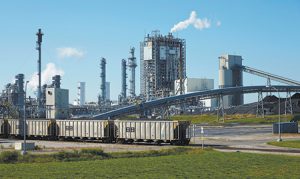First income gain for U.S. farms in four years signals hope
Signs of stability have returned to the farm economy, and farmland values could rise 2.3 percent this year following a decline in 2016, federal data shows.
Signs of stability have returned to the farm economy, and farmland values could rise 2.3 percent this year following a decline in 2016, federal data shows.
Massive flooding caused by Tropical Storm Harvey along Texas' refinery-rich coast could have long-standing and far-reaching consequences for the state's oil and gas industry and the larger U.S. economy.
The department said in a new report that the closure of many plants that once formed the backbone of the grid has raised the risk that consumers might not have reliable electricity.

The city said it will use the savings from the more energy-efficient lights to add another 4,000 streetlamps.
Vectren provides gas and/or electricity to more than 1 million customers in service territories that cover nearly two-thirds of Indiana and about 20 percent of Ohio.
Preservationists say they are concerned about the potential impact on recreation and endangered species. Forestry officials say selection techniques will be used to improve, not harm, the forest.

Industry players find themselves in a precarious spot. If they don’t embrace the electric-vehicle future, they look backward. But if they dive in with excessive exuberance, they risk wasting hundreds of millions of dollars.
The line would run from Kansas through Missouri and Illinois to Indiana, where it would connect with a power grid for eastern states.
Midwest Fertilizer Co. will begin construction on its Posey County manufacturing facility next year. Construction is projected to support more than 2,500 jobs.
The head of the Environmental Protection Agency has discussed a federal water rule with Indiana officials, but environmental groups say they weren't included in the conversation.
The Nina Mason Pulliam Charitable Trust awarded the funds to nine organizations involved in a multi-year initiative to protect, restore and better use the White River.
Maynard, Massachusetts-based AquaBounty Technologies plans to produce genetically engineered salmon at the facilities.
The departure of Timothy Hassinger comes as Dow AgroSciences’ parent prepares to merge with chemical giant DuPont.

Duke Energy Corp.’s massive, $3.5 billion power plant in Edwardsport, billed as a technological marvel, continues to deal with operating and maintenance setbacks.
Several states are seeking to join a legal challenge to a Trump administration decision to keep chlorpyrifos on the market, despite some studies showing it can harm children's brains.

An Indianapolis-based environmental engineering firm that moved into a new downtown headquarters last year has been acquired by Chicago-based Woodlawn Partners LLC and Detroit-based Peninsula Capital Partners LLC.
The slump marks a sharp turnaround in the egg business. In 2015, an avian influenza outbreak forced farmers to destroy millions of birds and prices skyrocketed.
American drivers are preparing to hit the road this Fourth of July as seasonal gas prices plunge to their lowest in 12 years.
Anderson Mayor Thomas Broderick Jr. is withholding support of the Mounds Greenway, the proposed trail along the White River between Muncie and Indianapolis.
Agribusiness giant Monsanto Co. is considering whether to go ahead with a planned seed-processing and distribution facility after Greenwood's mayor dropped his support for providing property tax breaks toward the project.